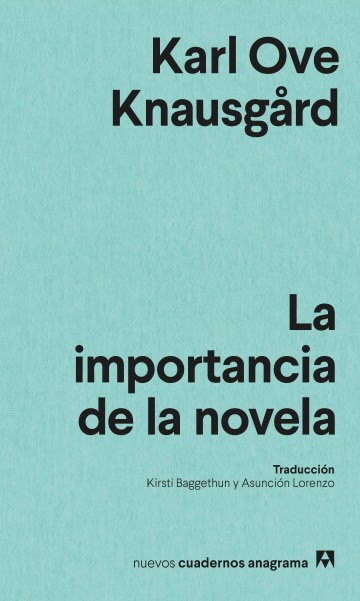
Original language: Norwegian
Original title: Why the novel is important
Translation: Kirsti Baggethun and Assumption Lawrence for Anagram
Year of publication: 2022
Valuation: highly recommended
I think it is unnecessary, at this point, to acknowledge my admiration for Karl Ove Knausgård; an author who, despite his many detractors (among whom several of them are in ULAD) also has many admirers after the publishing phenomenon, but also a reader, that led to the publication of “My struggle”, a fictionalized autobiography of more than three thousand pages from someone who, precisely before that publication, was someone unknown with a fairly ordinary life. The point is that his style, his forcefulness and the radicality of his stylistic nudity represented an abysmal change in the narrative of the self.
In the short work at hand, based on a speech given by the author in London in 2022, Knausgård faces the complex question of, not the quantification, but the qualification of the importance of the novel in our world. In this way, the Norwegian author, an avid reader and narrator from the subjectivity of the events that surround us, begins this very brief essay of just fifty pages by paraphrasing Rainer Maria Rilke who said that “music could elevate him – which in itself has no nothing special—, before adding: “And get off somewhere else.” For Knausgård, literature causes the same effect, “that strange feeling that invades you when you finish reading” and that is something that “happens with all good novels: they can fill me completely, but only in the moment; “When you finish reading, the experience fades.” It must be said that in this aspect I do not agree with him, or at least not entirely; His statement is something that causes me some concern because for me good literature leaves a residue, a sensation, that lasts a long time after finishing reading, perhaps not with the same intensity or the same emotion shared between author and reader, but yes. that changes us in part and not in a merely punctual way but in a sustained way.
The author states that “reading is closeness, it is getting closer to something” in the sense that when we read we contemplate attentively, looking for the detail, the details that make up the story, because “the novel includes any abstract idea about life , whether of a political, philosophical or scientific nature, within the sphere of the human, where it is no longer alone, but rather hits against a myriad of impressions, thoughts and acts. And that is where its strength lies, in that those small details and reflections that build the narrative are what bring us closer to it; They are the ones who make us fully enter the story and for this reason he mentions Joyce and Proust, highlighting that in their works they “get underneath the story to expand the brief time it lasts. Because? Because that’s where we live. In the same way, Zhadan’s “Orphanage” also stands out (a reading that I have written down for a long time), which “describes an event, a war, before it has become history, or, in other words, while it is still reality”, because the reality of a war is better if it is told while it is happening, when the protagonists are not even aware of what what is happening to them implies, not only on a global level, but in their own lives. That is the true event, the one that makes up each and every one of the changes in the daily lives of many lives subjected to a future that is always uncertain until the result is so clearly palpable that then yes, and only then, can we observe the impact and the catastrophe to which they have been heading without being fully aware of it. That is why the author states that “only a novel is capable of raising the most important conflicts that we encounter without locking them in definitions, but leaving them open to feelings and experiences”; There is the true impact and its reality.
Knausgård is consistent with his work, because precisely in “My Struggle” what he does is just that: fill the narrative with everyday details, everyday moments, approaching his own life so that, based on it, we can expand it and perhaps assimilate it with our own. And that is precisely the importance of his work, in that, being a very extensive book, he does not dwarf it with unnecessary details but rather it is, precisely and from them, that his novel expands and opens to each of the worlds that readers We share during the moments of reading it because “the novel gives voice to that experience, which thus finds a place. That place does not exist anywhere else (…) that place, that world seen from the inside and left open, only exists in the novel (…) The mission of the novel is to find the way to that place.
The author concludes by stating that “the mission of the novel is to enter the world and keep it open.” And hence its significance, because thanks to it we can get to know each other from others, other times and characters, because their lives and reflections are confronted with ours, and the dialogue between the two remains open while the memory of the reading remains alive in us.
Source: https://unlibroaldia.blogspot.com/2023/12/karl-ove-knausgard-la-importancia-de-la.html


